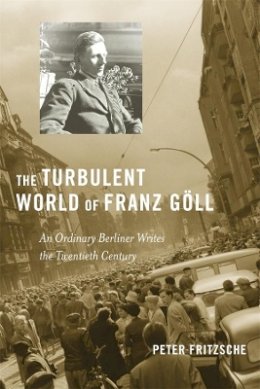16%OFF
Stock image for illustration purposes only - book cover, edition or condition may vary.
The Turbulent World of Franz Göll: An Ordinary Berliner Writes the Twentieth Century
Peter Fritzsche
FREE Delivery in Ireland
Description for The Turbulent World of Franz Göll: An Ordinary Berliner Writes the Twentieth Century
Hardback. Fritzsche traces twentieth-century history through the remarkable diaries of an ordinary Berliner. Franz Goll wrote of hungry winters during WWI, the Berlin bombing, rapes by Russian soldiers, shockwaves cast by Darwin, Freud, and Einstein, the flexing of U.S. superpower, and the strange lifestyles that marked Germany's transition to modernity. Num Pages: 288 pages, 25 halftones. BIC Classification: 1DFG; 3JJ; BG; HBJD; HBLW; HBTB. Category: (G) General (US: Trade). Dimension: 209 x 150 x 26. Weight in Grams: 466.
Franz Göll was a thoroughly typical Berliner. He worked as a clerk, sometimes as a postal employee, night watchman, or publisher's assistant. He enjoyed the movies, ate spice cake, wore a fedora, tamed sparrows, and drank beer or schnapps. He lived his entire life in a two-room apartment in Rote Insel, Berlin's famous working-class district. What makes Franz Göll different is that he left behind one of the most comprehensive diaries available from the maelstrom of twentieth-century German life. Deftly weaving in Göll’s voice from his diary entries, Fritzsche narrates the quest of an ordinary citizen to make sense of ... Read morea violent and bewildering century.
Peter Fritzsche paints a deeply affecting portrait of a self-educated man seized by an untamable impulse to record, who stayed put for nearly seventy years as history thundered around him. Determined to compose a “symphony” from the music of everyday life, Göll wrote of hungry winters during World War I, the bombing of Berlin, the rape of his neighbors by Russian soldiers in World War II, and the flexing of U.S. superpower during the Reagan years. In his early entries, Göll grappled with the intellectual shockwaves cast by Darwin, Freud, and Einstein, and later he struggled to engage with the strange lifestyles that marked Germany's transition to a fluid, dynamic, unmistakably modern society.
With expert analysis, Fritzsche shows how one man's thoughts and desires can give poignant shape to the collective experience of twentieth-century life, registering its manifold shocks and rendering them legible.
Show Less
Product Details
Publisher
Harvard University Press United States
Place of Publication
Cambridge, Mass, United States
Shipping Time
Usually ships in 7 to 11 working days
About Peter Fritzsche
Peter Fritzsche is Professor of History at the University of Illinois, Urbana-Champaign.
Reviews for The Turbulent World of Franz Göll: An Ordinary Berliner Writes the Twentieth Century
An extraordinary portrait of an ordinary twentieth-century Berliner's life. As an accomplished historian and a fine writer, Fritzsche uncovers the multiple resonances in Göll's political, social, and intellectual worlds. His deft and systematic handling of the intensely self-reflective Göll is quite simply fascinating.
Konrad H. Jarausch, University of North Carolina at Chapel Hill The account Fritzsche weaves out of ... Read moreGöll's idiosyncratic yet strangely representative diaries makes for fascinating, exciting reading. There are wonderful nuggets throughout, such as Göll's thoughtful reaction after seeing a pro-euthanasia film in 1941—the only such account by an actual member of the German public of which I am aware—and Göll's response to the notorious Nazi 'degenerate art' exhibition in 1937. This compelling book is for anyone who wants to view history from a more personal level.
Stephen Brockmann, Carnegie Mellon University Instructive and fitfully absorbing...Readers...will be fascinated by the strange private world of an eccentric obsessive.
Ian Brunskill
Wall Street Journal
A fascinating glimpse beneath the historical wave...Göll's diary is an amazing artifact in itself: in hundreds of plain, hand-written notebooks (now stored in a Berlin archive), it stretches from the era of Kaiser Wilhelm II to the age of Ronald Reagan. Göll lives through the aftermath of World War I, attends the Nazis' "Degenerate Art" exhibit in 1938, survives the bombing of Berlin during the Second World War, reflects on the rise of the nuclear age, and tries out, well into his fifties, the sexual revolution. All the while he works on his aquarium, travels around Germany, and reads widely and ravenously...Fritzsche helpfully summarizes and explains the diaries, putting them in a broader context and isolating the major themes; he reflects, too, on the very modern project of writing a diary.
Josh Rothman
Boston Globe online
This is a perceptive analysis of a 20th-century individual who cherished his perceived difference and who was at the same time representative of the masses, for better or worse.
Ulrike Zitzlsperger
Times Higher Education
In a time when public self-disclosure and blogging seem almost de rigueur, examining the diaries kept by a German everyman for the better part of the 20th century is both curious and refreshing...Though Fritzsche doesn't present extensive English translations of Göll's writings (the originals were impossibly voluminous), the quotations he includes are superb and include many of Göll's poems. He meticulously contextualizes them, convincingly argues the noteworthiness of their rediscovery, and reveals them as subjective attempts to fashion coherence out of increasingly violent times...They are also a sobering record of modern life's impact. Göll's diaries, begun in 1916, when he was 17, and continued until his death in 1984, offer an invaluable and absorbing look at the preoccupations of a turbulent century.
Publishers Weekly
Fritzsche's astounding book opens our eyes, once again, to the disappointing sight of an ordinary human being. And an ordinary human being is just that: ordinary.
Susanne Klingenstein
Weekly Standard
Show Less


